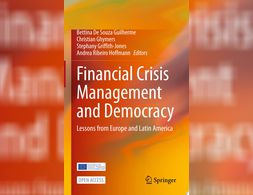✕
594 results
The course will teach students to analyze the goals, implementation, and outcomes of economic policy.
An essay of the writing workshop on contemporary issues in the field of Nigerian economics: In Nigeria, it appears that there is nothing in the constitution, which excludes the participation of women in politics. Yet, when it comes to actual practice, there is extensive discrimination. The under-representation of women in political participation gained root due to the patriarchal practice inherent in our society, much of which were obvious from pre-colonial era till date.
Recovery from the Covid-19 crisis provides a chance to implement economic measures that are also beneficial from environmental and social perspectives. While ‘green’ recovery packages are crucial to support economies tracking a low-carbon transition in the short-term, green measures such as carbon pricing are also key to improving welfare in the long-term. This commentary specifies the need for carbon pricing, outlines its implications for our everyday lives, and explains how it works alongside value-based change in the context of climate action and societal well-being.
This syllabus provides an overview of the contents of the course "Understanding Economic Models" at the University of Helsinki.
Here we look at the effect of the 2008 Climate Change Act passed in Parliament in the United Kingdom as an effort to curb emissions in all sectors. The Act aside from setting goals to become a low-carbon economy sets up an independent committee on Climate Change to ensure the implementation of policies to comply with the ultimate goal of 80% reduction in total emissions in 2050. I make use of the Synthetic Control Method (SCM) to create a comparative case study in which the creation of a synthetic UK serves as a counterfactual where the treatment never occurred (Cunningham, 2018).
If there’s one method economists have neglected the most, it’s qualitative research. Whereas economists favour mathematical models and statistics, qualitative research seeks to understand the world through intensive investigation of particular circumstances, which usually entails interviewing people directly about their experiences. While this may sound simple to quantitative types the style, purpose, context, and interpretation of an interview can vary widely. Because of this variety, I have written a longer post than usual on this topic rather than doing it a disservice. Having said that, examples of qualitative research in economics are sadly scant enough that it doesn’t warrant multiple posts. In this post I will introduce qualitative research in general with nods to several applications including the study of firm behaviour, race, Austrian economics, and health economics. More than usual I will utilise block quotes, which I feel is in the spirit of the topic.
In a capitalist system, consumers, investors, and corporations orient their activities toward a future that contains opportunities and risks. How actors assess uncertainty is a problem that economists have tried to solve through general equilibrium and rational expectations theory. Powerful as these analytical tools are, they underestimate the future's unknowability by assuming that markets, in the aggregate, correctly forecast what is to come.
Economic development is a process of continuous technological innovation and structural transformation. Development thinking is inherently tied to the quest for sustainable growth strategies. This book provides a neoclassical approach for studying the determinants of economic structure and its transformation and draws new insights for development policy.
In this book, Kalyan Sanyal reviews the traditional notion of capitalism and propounds an original theory of capitalist development in the post-colonial context. In order to substantiate his theory, concepts such as primitive accumulation, governmentality and post-colonial capitalist formation are discussed in detail.
This is an introductory lecture to Stock Flow Consistent SFC modelling Antoine Godin presents this family of macroeconomic models which is based on a rigorous accounting framework and guarantees a correct and comprehensive integration of all the flows and the stocks of an economy SFC models focus especially on interactions …
The COVID-19 pandemic has had far-reaching implications across the African continent. This discussion brings to light the role of African think tanks, such as the African Center for Economic Transformation (ACET) in rethinking the continent’s development models, especially, in light of the unprecedented crisis.
The background for the present elaboration is twofold firstly the ongoing debate about whether the Marxian theory of value has been damaged or even destroyed by the alleged impossibility of solving the transformation problem and secondly the fact that almost all of the later economic manuscripts of Marx are now …
Ob Klima-Migration ein Sicherheitsrisiko oder eine Chance darstellt, liegt in den Händen der Politik
Der Klimawandel dürfte die globalen Migrationsbewegungen in den kommenden Jahren deutlich verstärken – was die Politik gleich an mehreren Fronten unter Handlungsdruck setzt.
Sustainable Development has become dominant in policy debates in the last two decades. Standard models in neoclassical economics as taught in undergraduate classes fail to capture the complex relationships between the economy and the environment.
Designed to give second-year undergraduates an intuitive understanding of basic mathematical techniques, and when and why they are applicable. Building on the traditional framework of calculus, the notion of a concave function is used to link the new algebraic methods with the more familiar graphical approachoand to introduce the modern use of duality in economic analysis.
Latin America and Europe can both learn from their respective experiences on crisis response and the distributive and democratic implications at national and regional level Democratic and distributive aspects of crisis response monetary financial economic policies and institutional reforms are key but have not been adequately addressed in the literature …
This book is intended as a textbook for a course in behavioural economics for advanced undergraduate and graduate students who have already learned basic economics. The book will also be useful for introducing behavioural economics to researchers. Unlike some general audience books that discuss behavioural economics, this book does not take the position of negating traditional economics completely.
This chapter discusses the role of gender in economic relations, processes, and outcomes. Gender differences in economic outcomes such as labor force participation and wages have received growing attention from economists in the last several decades – a positive and much needed development in economic thinking.
Feminist economics is a key component of the movement for pluralism in economics and one that has, to some extent, been acknowledged by the mainstream of the profession. It seeks to highlight issues which affect women because (it claims) they have not traditionally been recognised in a field dominated by men. On top of this, it seeks to carve out a space for women in the discipline, both for intrinsic reasons of fairness and diversity and because it means that women’s issues are more likely to be highlighted going forward.
In both economics textbooks and public perceptions central banks are a fact of life. On the wall of my A-level economics classroom there was the Will Rogers quote “there have been three great inventions since the beginning of time: fire, the wheel, and central banking”, summarising how many economists view the institution. There is a widespread belief that there is something different about money which calls for a central authority to manage its operation, a view shared even by staunch free marketeers such as Milton Friedman. This belief is not without justification, since money underpins every transaction in a way that apples do not, but we should always be careful not to take existing institutions for granted and central banking is no exception. In this post I will look at the idea of private or free banking, where banks compete (and cooperate) to issue their own currency.
Exploring Economics, an open-source e-learning platform, giving you the opportunity to discover & study a variety of economic theories, topics, and methods.
This course is intended to present some of the main ideas underlying the micro aspects of gender economics. The courses will tackle issues as fertility, marriage, women labor force participation, wage gap, gender inequality, violence against women and women empowerment within her household and within the society where she lives.
By the end of this course, students should understand the basic economic theories of the gender division of labor in the home and at the workplace, and theories of gender differences in compensation and workforce segregation.
This lecture course, which will be taught in English, will deal with gender issues in developing countries. After providing an overview of the gender differences in various aspects of welfare and economic life, the course will then tackle a number of specific issues.
Some economic events are so major and unsettling that they “change everything.” Such is the case with the financial crisis that started in the summer of 2007 and is still a drag on the world economy. Yet enough time has now elapsed for economists to consider questions that run deeper than the usual focus on the immediate causes and consequences of the crisis.
Financial Evolution at the Speed of Thought A new evolutionary explanation of markets and investor behaviorHalf of all Americans have money in the stock market yet economists can t agree on whether investors and markets are rational and efficient as modern financial theory assumes or irrational and inefficient as behavioral …
As the current economic crisis spreads around the globe questions are being asked about what king of capitalist or post-capitalist economy will follow. There is increasing talk of the need for stringent economic regulation, the need to temper greed and individualism, to make the economy work for human and social development.
This course will introduce key concepts, theories and methods from socioeconomics. The first part of the course, will deal with the main economic actors and how their interactions are governed. Markets are seen as sets of social institutions. Institutions shape how consumers, firms and other economic actors behave. While it is difficult to understand how novelty emerges, we can study the conditions that are conducive to innovation. We will review how economic performance, social progress and human wellbeing are measured and what progress has been made. In the second part of the course, we will study a specific macroeconomic model that accounts for biophysical boundaries and inequality.
Three dominant forces worldwide are driving change today in our financial markets: competition, technology and regulation. But their collective impact in reshaping the markets, though they may be viewed individually as desirable or well-intentioned, is producing challenging results that are difficult to predict, hard to control and not easy to understand.
The premise of this workshop is that we, as knowledge producers - especially within westernized universities (Grosfoguel, 2013), are significantly implicated in neoliberal imaginaries that are often in service of hierarchical, binary, competitive and linear narratives of growth as civilizational progress.
Green Growth has been increasingly discussed as a solution to the socio-ecological crisis. But can economic growth be sustainable at all?
Trade disputes are usually understood as conflicts between countries with competing national interests, but as Matthew C. Klein and Michael Pettis show in this book, they are often the unexpected result of domestic political choices to serve the interests of the rich at the expense of workers and ordinary retirees.
We use cookies on our website. Click on Accept to help us to make Exploring Economics constantly better!


























